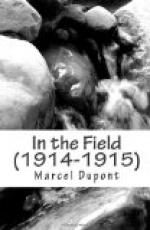Arriving at Pevy the evening before, just before midnight, we had found refuge in a house belonging to a peasant. The hostess, a good old soul of eighty, had placed at our disposal a small bare room paved with tiles, in which our orderlies had prepared a sumptuous bed of trusses of straw. The night had been delightful, and we should have awaked in good spirits had it not been for the distressing fact noticed by my friend.
“It is raining,” said F.
I could not but agree with him. Those who have been soldiers, and especially cavalrymen, know to the full how dispiriting is the sound of those few words: “It is raining.”
“It is raining” means your clothes will be saturated; your cloak will be drenched, and weigh at least forty pounds; the water will drip from your shako along your neck and down your back; above all, your high boots will be transformed into two little pools in which your feet paddle woefully. It means broken roads, mud splashing you up to the eyes, horses slipping, reins stiffened, your saddle transformed into a hip-bath. It means that the little clean linen you have brought with you—that precious treasure—in your saddlebags, will be changed into a wet bundle on which large and indelible yellow stains have been made by the soaked leather.
But it was no use to think of all this. The orders ran: “Horses to be saddled, and squadron ready to mount, at 6.30.” And they had to be carried out.
It was still dark. I went out into the yard, after pulling down my campaigning cap over my ears. Well, after all, the evil was less than I had feared. It was not raining, but drizzling. The air was mild, and there was not a breath of wind. When once our cloaks were on it would take some hours for the wet to reach our shirts. At the farther end of the yard some men were moving about round a small fire. Their shadows passed to and fro in front of the ruddy light. They were making coffee—jus, as they call it—that indispensable ration in which they soak bread and make a feast without which they think a man cannot be a good soldier.
I ran to my troop through muddy alleys, skipping from side to side to avoid the puddles. Daylight appeared, pale and dismal. A faint smell rose from the sodden ground.
“Nothing new, mon Lieutenant,” were the words that greeted me from the sergeant, who then made his report. I had every confidence in him; he had been some years in the service, and knew his business. Small and lean, and tightly buttoned into his tunic, in spite of all our trials he was still the typical smart light cavalry non-commissioned officer. I knew he had already gone round the stables, which he did with a candle in his hand, patting the horses’ haunches and looking with a watchful eye to see whether some limb had not been hurt by a kick or entangled in its tether.




